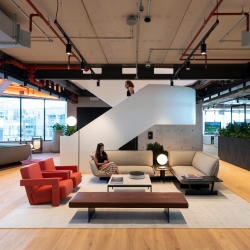June 10, 2021
UK organisations risk losing talent if lacking in empathetic leadership
 New research commissioned by Workplace from Facebook claims there is a growing demand from UK employees for more empathetic leaders since the pandemic. (more…)
New research commissioned by Workplace from Facebook claims there is a growing demand from UK employees for more empathetic leaders since the pandemic. (more…)
Wellbeing at Work Summit US 2026,
New York, Austin and Online
03 March 2026
More information
CoreNet APAC Summit -Innovate to Thrive: Driving Strategic Growth, Empowering Real Estate Leadership,
Kuala Lumpur
03 March 2026
More information
Data Centre World London,
London
04 March 2026
More information
The Future of Work Management,
London
05 March 2026
More information
Working Symposium,
London
05 March 2026
More information
Mould Exhibition,
London
05 March 2026
More information
Interior Design Exhibition in Leeds - Design Festival North,
Leeds
11 March 2026
More information
World Workplace Europe,
The Hague
11 March 2026
More information

June 10, 2021
by Jayne Smith • News, Wellbeing, Working culture
 New research commissioned by Workplace from Facebook claims there is a growing demand from UK employees for more empathetic leaders since the pandemic. (more…)
New research commissioned by Workplace from Facebook claims there is a growing demand from UK employees for more empathetic leaders since the pandemic. (more…)
June 10, 2021
by Jayne Smith • Flexible working, News, Wellbeing, Working lives
 Research from Love Energy Savings claims that nearly half of parents (46 percent) are concerned about missing key moments in their child’s development when they return to working in the office. (more…)
Research from Love Energy Savings claims that nearly half of parents (46 percent) are concerned about missing key moments in their child’s development when they return to working in the office. (more…)
June 8, 2021
by Jayne Smith • News, Wellbeing, Working lives
 According to research from Randstad UK, more than a third of workers told the recruiter that the pandemic had left them feeling ‘aimless’ while more than a quarter of employees said the pandemic had left them unable to concentrate properly. A third described how the pandemic had sapped their motivation. (more…)
According to research from Randstad UK, more than a third of workers told the recruiter that the pandemic had left them feeling ‘aimless’ while more than a quarter of employees said the pandemic had left them unable to concentrate properly. A third described how the pandemic had sapped their motivation. (more…)
June 3, 2021
by Neil Franklin • Corporate social responsibility, News
 The majority of companies believe that their purpose is not solely to make money, according to a new survey by one of Britain’s best known business associations. The Institute of Directors claims that its recent poll shows companies are re-assessing their role in society. It says the findings come at a time when corporations are facing greater pressure to recognise the impact of their decisions on the environment and the communities in which they work. (more…)
The majority of companies believe that their purpose is not solely to make money, according to a new survey by one of Britain’s best known business associations. The Institute of Directors claims that its recent poll shows companies are re-assessing their role in society. It says the findings come at a time when corporations are facing greater pressure to recognise the impact of their decisions on the environment and the communities in which they work. (more…)
June 1, 2021
by Neil Franklin • Flexible working, News
![]() The British Chambers of Commerce (BCC) has released new figures suggesting that over two thirds (66 percent) of businesses surveyed now offer flexible working to employees. The data, from a survey of over 900 businesses conducted in April 2021, also shows nearly three quarters of businesses expect to have at least one employee working remotely over the coming year, with the average expectation among those firms being just over half of their employees working remotely. (more…)
The British Chambers of Commerce (BCC) has released new figures suggesting that over two thirds (66 percent) of businesses surveyed now offer flexible working to employees. The data, from a survey of over 900 businesses conducted in April 2021, also shows nearly three quarters of businesses expect to have at least one employee working remotely over the coming year, with the average expectation among those firms being just over half of their employees working remotely. (more…)
May 26, 2021
by Neil Franklin • Company news, Workplace design
 When it comes to conversations about work and workplaces, the past year has offered a fully immersive experience. Everybody now has an opinion. Inevitably some of them are better informed and more rooted in experience than others. So, after a full year of talk and as we return to some form of routine working life, the time has come to take stock. Few organisations and people will remain untouched by the sudden shift in attitudes towards working life, so we asked four workplace experts for their views on the current state of play. (more…)
When it comes to conversations about work and workplaces, the past year has offered a fully immersive experience. Everybody now has an opinion. Inevitably some of them are better informed and more rooted in experience than others. So, after a full year of talk and as we return to some form of routine working life, the time has come to take stock. Few organisations and people will remain untouched by the sudden shift in attitudes towards working life, so we asked four workplace experts for their views on the current state of play. (more…)
May 26, 2021
by Jayne Smith • News, Wellbeing, Working culture
 New research conducted by McCarthy Stone, claims to expose the true scale of Ageist Britain, reporting that over a quarter (27 percent) of over 65s in the UK – equivalent to more than three million people – have been victims of ageism. 60 percent of UK adults believe it’s a problem that needs fixing. (more…)
New research conducted by McCarthy Stone, claims to expose the true scale of Ageist Britain, reporting that over a quarter (27 percent) of over 65s in the UK – equivalent to more than three million people – have been victims of ageism. 60 percent of UK adults believe it’s a problem that needs fixing. (more…)
May 19, 2021
by Jayne Smith • News, Wellbeing, Working lives
 A report published by single parent charity, Gingerbread, and the Institute for Employment Studies highlights how the world of work simply doesn’t work for single parents and warns things are set to get worse before they get better – putting even more single parent families at risk of poverty and creating a two-tier society, with single parents firmly at the bottom. (more…)
A report published by single parent charity, Gingerbread, and the Institute for Employment Studies highlights how the world of work simply doesn’t work for single parents and warns things are set to get worse before they get better – putting even more single parent families at risk of poverty and creating a two-tier society, with single parents firmly at the bottom. (more…)
May 17, 2021
by Jayne Smith • Business, News
 New research from IPSE (the Association of Independent Professionals and the Self-Employed) claims almost a quarter of freelancers (24 percent) report their businesses returning to pre-pandemic levels, while nearly a third (29 percent) predict the easing of restrictions will give an added boost to their businesses. A fifth (19 percent) said their businesses had been largely unaffected by the pandemic. (more…)
New research from IPSE (the Association of Independent Professionals and the Self-Employed) claims almost a quarter of freelancers (24 percent) report their businesses returning to pre-pandemic levels, while nearly a third (29 percent) predict the easing of restrictions will give an added boost to their businesses. A fifth (19 percent) said their businesses had been largely unaffected by the pandemic. (more…)
May 4, 2021
by Stephen Bevan • Features, Flexible working, Wellbeing
 Has working at home during lockdown made people more productive or not? This has been the subject of some lively debate recently. Many companies do not routinely measure productivity. A large number will have traditionally assumed that they get the highest output when staff work longer hours or under close supervision, but remote working is clearly causing some to re-evaluate this. Major firms, for instance professional services group PwC, have been sufficiently impressed to make remote working a permanent option for their staff. (more…)
Has working at home during lockdown made people more productive or not? This has been the subject of some lively debate recently. Many companies do not routinely measure productivity. A large number will have traditionally assumed that they get the highest output when staff work longer hours or under close supervision, but remote working is clearly causing some to re-evaluate this. Major firms, for instance professional services group PwC, have been sufficiently impressed to make remote working a permanent option for their staff. (more…)








June 4, 2021
Expect to see a growing number of people with the job title Head of Remote
by Jo Deal • Comment, Flexible working